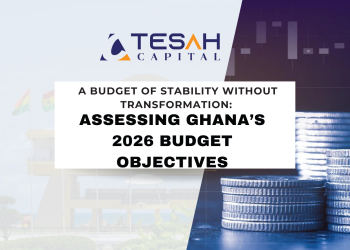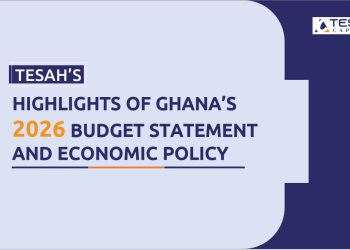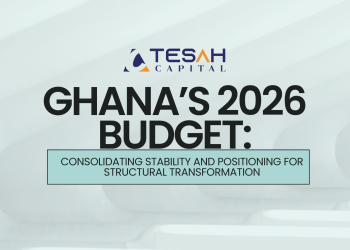Ghana is currently experiencing one of the most challenging economic times in recent years. The difficulties confronting the country as it heads into the 2023 fiscal year include anemic economic growth, high unemployment, elevated inflation, severe currency depreciation, deteriorating gross international reserves and a looming public debt crisis. These put the finance minister in a critical position to present a budget that meets Ghanaians’ expectations and gives hope of an economic “miracle” in the near term.
In addition to the perennial calls for previous budgets to be prudent in public spending and efficient in the use of public funds, we have identified a couple of suggestions that may help the government in managing public expectations and aid in dealing with some of the economic challenges.
First, we expect the 2023 budget to have realistic targets. As the government negotiates with the IMF for a bailout and a possible debt restructuring with creditors, it is imperative that the managers of the economy have a better sense of the true state and outlook of the economy. Debt Sustainability Analysis (DSA) strongly rely on forecasts of key macroeconomic variables. The worst possible outcome for the country is falling for the temptation of insufficient debt relief (either from the IMF or Creditors) leading to serial debt restructuring all based on a false sense of optimism about economic targets. We may be a proud nation but desperate times such as this require realism.
Table 1: Targets for Key Economic Indicators
| Economic Indicator | 2022 Budget Target | Revised Target |
| Real GDP growth rate | 5.80% | 3.70% |
| End-December inflation rate | 8% | 28.50% |
| Fiscal deficit | 7.4% of GDP | 6.60% |
| Primary surplus | 0.1% of GDP | 0.40% |
| Gross International Reserves | >= 4 months of imports cover | >= 3 months import cover |
Source: Ministry of Finance
We are of the opinion that the 2022 budget presented by the minister of finance in November 2021 contributed to worsening economic outcomes in the country. All the targets presented in November 2021 had to be revised in the mid-year budget. We still expect some variables to end the year worse than their revised targets in the mid-year budget.
Real GDP growth rate from Table 1 above was forecasted to be 5.8% in the 2022 budget but was later revised to 3.7%. In the recent IMF global economic outlook, the fund’s economists project real GDP in Ghana to grow by 3.6%. Inflation rate was projected to end the year at the Bank of Ghana’s target of 8% but was revised in the mid-year budget to 28.5%. In the July 2022 monetary policy report by the Bank of Ghana, the economists at the Bank projected inflation to end the year at about 34%. Given the most recent weakening of the cedi and elevated inflation expectations, we expect inflation to end the year worse than the target of the government. The government also targeted a gross international reserve of not less than 4 months of import in the 2022 Budget but revised it to not less than 3 months. The gross international reserve declined by about $2 billion in the first half of the year alone. This was mainly due to the lack of international capital market access and sell-offs by investors who held government of Ghana bonds. These conditions have at best not improved in the second half of the year and thus pose a severe risk to the gross international reserve outlook.
We admit that missing an economic target or two is not the worst crime a minister of finance can commit. However, setting targets which give a false sense of optimism will be extremely detrimental to our IMF program and the possible debt restructuring, especially when there are clear and obvious indications of the true outlook of the economic indicators. For example, we believe if the government had been a little conservative in its outlook for revenue, inflation, or interest rates in the 2022 budget, they would have realized much earlier that public debt was becoming unsustainable. This would have led them to the IMF earlier than they did. The 2023 budget statement should be void such bold and optimistic targets.
In addition to having realistic macroeconomic targets, we expect the budget to be more transparent especially in dealing with the looming public debt crisis. The DSA will require the government to declare all hidden and contingent liabilities. This is central in assessing informed overall debt trajectory risks. Being transparent with the economic (and in particular public debt) data helps to better apprehend distribution of risks among all stakeholders including the Ghanaian public, many of whom are government bond holders.
Recently, the ministry of finance has lagged in publishing key economic information especially when they are most needed. The Public Financial Management Act, 2016 (Act 921) requires the public debt management office to “on a rolling basis, update the Medium-Term Debt Management Strategy at least once a year; and submit the update in respect of the Medium-Term Debt Management Strategy to the Minister. The Minister shall not later than December of the preceding year, review the Medium-Term Debt Management Strategy and submit the strategy to Cabinet for approval. The Minister shall publish the approved Medium-Term Debt Management Strategy on the website of the Ministry and any other medium determined by the Minister.”
The last time the Medium-Term Debt Management Strategy was updated was March 2021. Given that the economic landscape in the country has changed and the Ghanaian public is longing for some forward guidance, we will suggest to the finance minister to fulfil this requirement.
To conclude, we believe a transparent budget with realistic targets will go along way to guide expectations not only for creditors but also the public. We will also continue to emphasize the need for the 2023 budget to be one that is prudent in spending and efficient in the use of public funds.
Written by
Dennis Nsafoah
Assistant Professor of Economics
Niagara University, NY
Member of Research Committee, Tesah Capital






